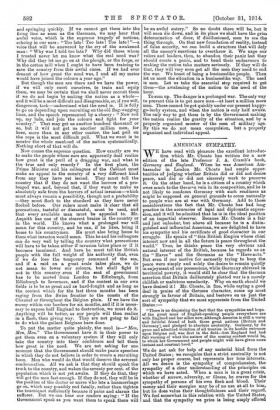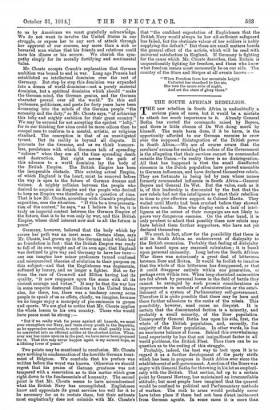AMERICAN SYMPATHY.
WE have read with pleasure the excellent introduc- tion which Mr. Choate has written for a new edition of the late Professor J. A. Cramb's book, Germany and England. When he was American Am- bassador in London Mr. Choate had ample oppor- tunities of judging whether Britain did or did not desire peace, and did or did not sincerely work to preserve it. On the other hand, he is a citizen of a country which owes much to the German vein in its composition, and he is not likely to condemn Germany with such readiness as might be supposed on general grounds to come naturally to people who are at war with Germany. Add to these considerations the fact that Mr. Choate has had long practice in the accuracies of legal and diplomatic expres- sion, and it will be admitted that he is in the ideal position of an impartial observer. Because Mr. Choate is a fair and just onlooker, but above all because he is a distin- guished and influential American, we are delighted to have his sympathy and his certificate of good character in our struggle. He speaks of "this British Empire whose chief interest now and in all the future is peace throughout the world." True, he thinks peace the very obvious and natural interest of the British, because he regards us as the " Haves " and the Germans as the "Have-nots." But even if our motive for earnestly trying to keep the peace were simply and solely the desire to remain quietly in enjoyment of our possessions, while Germany shivered in territorial poverty, it would still be clear that the German assertion that Britain deliberately plotted war is a merely childish or malicious mendacity. Why on earth should we have desired it ! Mr. Choate, in fine, while saying a good deal in praise of the German character, sums up most strongly in favour of Britain, and bestows on us just the sort of sympathy that we most appreciate from the United States :— " There is no disguising the fact that the sympathies and hope. of the great mass of English-speaking people everywhere are with England and her allies now, although America is still a warm and faithful friend of both these great nations [Britain and Germany], and pledged to absolute neutrality. Germany, by its gross and admitted violation of all treaties in its hostile entrance upon Belgian soil, was first in the field—but England had had full warning of what the nature of the coming contest would be, to which her Government and people might well have given more instant and constant heed."
We do not ask for help of any material kind from the United States ; we recognize that a strict neutrality is not only her proper course, but represents her true interests. All we desire is the sympathy of comprehension, the sympathy of a clear understanding of the principles on which we have acted. When a man is in a great crisis, whether of sorrow, adversity, or illness, he craves for the sympathy of persons of his own flesh and blood. Their money and their energies may be of no use at all to him, but he does value their thoughtfulness and their regard. We feel somewhat in this relation with the United States, and that the sympathy we prize is being amply offered to us by Americans we must gratefully acknowledge. We do not want to involve the United States in our struggle, or expose her to any sort of attack through her approval of our courses, any more than .a sick or bereaved man wishes that his friends and relations could have his illness or his sorrow. We cherish the sym- pathy simply for its morally- fortifying and sentimental value.
Mr. Choate accepts Cramb's explanation that German ambition was bound to end in war. Long ago Prussia had established an intellectual dominion over the rest of Germany. But step by step this dominion was expanded into a dream of world dominion—not a purely material dominion, but a spiritual dominion which should "make the German mind, the German genius, and the German character prevail over all the world." To this end professors, politicians, and poets for forty years have been drumming into the minds of the German people "the necessity and the duty," as Mr. Choate says, "of achieving this lofty and mighty ambition for their great country." We may be excused for not accepting the epithet "lofty," for to our thinking few aims could be more odious than to compel men to conform to a mental, artistic, or religious standard. The conception is that of an unmitigated tyrant. But its reality is beyond all dispute. It accounts for the tiresome, and as we think humour- less, persistence with which Germans talk of spreading "culture" when they are all the time spreading death and destruction. But right across the path of this advance to a world dominion lay the body of the British Empire. The British Empire has been the insuperable obstacle. This existing actual Empire, of which England is the heart, must be removed before the way is open to the future of German dreams and visions. A mighty collision between the people who desired to acquire an Empire and the people who desired to keep an Empire was therefore only a question of time. That is how Mr. Choate, according with Cramb's prophetic exposition, sees the situation. "If this be a true presenta- tion of the contest," he says, "as I believe it to be, it is truly an imperial contest between the German Empire of the future, that is to be won only by war, and this British Empire, whose chief interest now and in all the future is peace."
Germany, however, believed that the body which lay across her path was an inert mass. Certain ideas, says Mr. Choate, had grown up in the German mind which had no foundation in fact : that the British Empire was ready to fall of its own weight and of its own age; that England was destined to give way and Germany to have her turn— one can imagine how minor professors turned confused and misconceived theories of evolution to their purpose on this subject—and that the Englishman was degenerate, softened by luxury, and no longer a fighter. But so far from the race of Cromwell and Milton having lost its quality, "it now reappears upon the scene with all its ancient courage and virtue." It may be that the war has in some respects destroyed illusions in the United States also, for there, too, there was a tendency among some people to speak of us as effete, chiefly, we imagine, because we no longer enjoy a monopoly of pre-eminence in games and sports. We are glad to notice that Mr. Choate applies the whole lesson to his own country. Those who would have peace must be strong :— " But if we really wish for peace against all hazards, we must ever strengthen our Navy, and train every youth in the Republic, as he approaches manhood, to such extent as shall qualify him to be converted into an efficient soldier at the shortest notice. When- ever war has come upon us in the past, we have never been prepared for it. That this may never happen again is my earnest hope, as a lifelong lover of peace."
Two points may be mentioned in conclusion. Mr. Choate says nothing in condemnation of the horrible German treat- ment of Belgium. We conclude that his preface was written before the worst was known. Otherwise we should regret that his praise of German greatness was not tempered with a reservation as to this matter which goes right down to the fundamentals of humanity. The second point is that Mr. Choate seems to have misunderstood what the British Navy has accomplished. Englishmen know and appreciate its great services too well for it to be necessary for us to restate them, but their estimate most emphatically does not coincide with Mr. Choate's that "the confident expectation of Englishmen that the British Navy would always be her all-sufficient safeguaed has failed, but the obstinate valour of her soldiers is nobly supplying the default." But these are small matters beside the general effect of the article, which will be read with universal satisfaction in England. If Germany is fighting for the cause which Mr. Choate describes, then Britain is unquestionably fighting for freedom, and those who know what freedom means must necessarily be on our side. The country of the Stars and Stripes at all events knows :— " When Freedom from her mountain height Unfurled her standard to the air, She tore the azure robe of night, And set the stars of glory there."



































 Previous page
Previous page